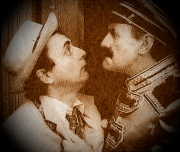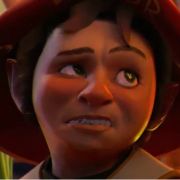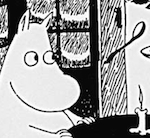|
After The War posted:We should talk. Sure, about what? Am I about to get broken up with or fired?
|
|
|
|

|
| # ? May 13, 2024 16:26 |
|
Dr. Kloctopussy posted:Sure, about what? Don’t worry, he wants to talk after the war. You have plenty of time to prepare yourself.
|
|
|
|
Djeser posted:I've read a story told in non-linear epistolary format with paragraphs from two sources interleaved so it alternated between an article about the protagonist's birth and the protagonist's death. And that was in a sci-fi book, which everyone knows means it was genre garbage for babies. I recently finished reading Excession, where half the story is told in usenet posts by giant spaceships, which was cool. I want more of that and less new SF authors following the loving "Save the Cat" formula.
|
|
|
|
Stuporstar posted:I recently finished reading Excession, where half the story is told in usenet posts by giant spaceships, which was cool. I want more of that and less new SF authors following the loving "Save the Cat" formula. It's YA, so probably a little more Save-The-Cat in terms of narrative content (like what happens and when), but The Illuminae Files is "told through a fascinating dossier of hacked documents—including emails, schematics, military files, IMs, medical reports, interviews, and more." There is, perhaps, a bit of cheating in the sections that are "summaries of security footage," but it's not too bad. And it also involves giant spaceships. On the other hand: "As Kady hacks into a tangled web of data to find the truth, it’s clear only one person can help her bring it all to light: the ex-boyfriend she swore she’d never speak to again!" I would strongly recommend this book to people who like YA Sci-fi, fairly strongly to people who like YA or sci-fi, and leave everyone else to make up their own mind based on the blurbs. Parts of it are annoying to read on an e-ink eReader, though.
|
|
|
|
So I have my first bit of interest from a publisher. We'll see how it goes in a month or four I guess! Most likely won't go anywhere but hey, plenty more attempts after that.
|
|
|
|
Dr. Kloctopussy posted:Sure, about what? Worse, I want to pick your brain about teaching nerds to write.  REMEMBER SPONGE MONKEYS posted:Don’t worry, he wants to talk after the war. You have plenty of time to prepare yourself. Yeah. When I switched to using this screen name, I had just broken up with someone who had been cyberstalking me while we were still together ("I can't believe you bought yourself a record on eBay, you're so immature with your money!") so I needed to think of something she was totally unfamiliar with, and remembered the name of my un 
|
|
|
|
showbiz_liz posted:Oh speaking of (sorta) - I just read About Writing by Samuel Delany, which I enjoyed and identified with a lot more than the last book I read on writing (Bird By Bird). However, along with a lot of really solid advice and interesting perspectives on fiction writing, it also had a lot more emphasis on ~magnificent craftsmanship~ than I personally care about. It's a great book if you're a serious writer. (And by serious I mean thinking about how to make your reputation; that's not a dis.) There's some discussion here. quote:I think if I had read it a few years ago, I would have found it more discouraging than inspiring, because it sort of dismisses 'merely good' writing as being fundamentally less valuable than 'great' writing, a stance I can't really agree with. What did you disagree with here? The distinction between competent and interesting writing seems pretty inarguable to me. showbiz_liz posted:This is all totally fair! And I'd still definitely recommend it. (It also made me want to check out his book Times Square Red, Times Square Blue, which as I understand it is about 50% intricate meditations on the nature of urban space and 50% memoirs of gay orgies in '70s porn theaters.) This is exactly it.
|
|
|
|
Safety Biscuits posted:What did you disagree with here? The distinction between competent and interesting writing seems pretty inarguable to me. I'm not saying he's wrong, just that I would have found it personally discouraging, for not-necessarily-rational reasons. It took me a long time to get over the feeling that if I couldn't immediately produce a flawless masterpiece, I really shouldn't bother trying to write. I only managed to start producing work once I got over the feeling that it Had To Be Perfect.
|
|
|
|
Yeah imo from a lit crit perspective I can see the argument the guy seems to be making, but from the perspective of someone offering advice to writers, "writing isn't valuable unless it's Meaningful and your Opus" seems like not the best perspective have, especially if you're someone who's still learning as a writer and can benefit from practice.
|
|
|
|
showbiz_liz posted:I'm not saying he's wrong, just that I would have found it personally discouraging, for not-necessarily-rational reasons. It took me a long time to get over the feeling that if I couldn't immediately produce a flawless masterpiece, I really shouldn't bother trying to write. I only managed to start producing work once I got over the feeling that it Had To Be Perfect. This is keeping me pretty well frozen out aside from notes and occasional brainstorming.
|
|
|
|
Dr. Kloctopussy posted:It's YA, so probably a little more Save-The-Cat in terms of narrative content (like what happens and when), but The Illuminae Files is "told through a fascinating dossier of hacked documents—including emails, schematics, military files, IMs, medical reports, interviews, and more." There is, perhaps, a bit of cheating in the sections that are "summaries of security footage," but it's not too bad. And it also involves giant spaceships. Sounds interesting enough I've put it on hold at the library. Thanks showbiz_liz posted:I'm not saying he's wrong, just that I would have found it personally discouraging, for not-necessarily-rational reasons. It took me a long time to get over the feeling that if I couldn't immediately produce a flawless masterpiece, I really shouldn't bother trying to write. I only managed to start producing work once I got over the feeling that it Had To Be Perfect. Djeser posted:Yeah imo from a lit crit perspective I can see the argument the guy seems to be making, but from the perspective of someone offering advice to writers, "writing isn't valuable unless it's Meaningful and your Opus" seems like not the best perspective have, especially if you're someone who's still learning as a writer and can benefit from practice. I'd have to read Delaney's book myself (and it sounds like the kind of writing advice I prefer given where I'm at), but I want to say that shooting for the moon gets really loving fun once you get over the fear of failure. Like, you go into assuming you're probably gonna gently caress it up and just have fun experimenting. If you have to trash it afterward, at least you learned something, so it's not a waste of time. Sure, new writers benefit more from figuring out the rules. The real trap is becoming an alcolyte to some guru with a magic formula, the kind of advice-giver who promises the One Easy Trick to Writing a Bestseller, because they're preying on all those people afraid to fail, who want to write a perfect first draft and instantly get it published without having to sweat over it. I'm not accusing anyone of that here. It's just what I meant by "genre-workshop writing rules" earlier. What I love most about this forum is when someone comes in asking, "Can I do X?" the response is usually, "Try it and see." It's so much better than a lot of poo poo I see online, with writers/editors proclaiming that "only amatuers write in first person!" or "all flashbacks are bad!" If you listened to all these assholes, you'd plateau at merely competent and never write anything great--after all, how can you if you never take risks?
|
|
|
|
showbiz_liz posted:I'm not saying he's wrong, just that I would have found it personally discouraging, for not-necessarily-rational reasons. Ah, fair enough! Djeser posted:Yeah imo from a lit crit perspective I can see the argument the guy seems to be making, but from the perspective of someone offering advice to writers, "writing isn't valuable unless it's Meaningful and your Opus" seems like not the best perspective have, especially if you're someone who's still learning as a writer and can benefit from practice. This isn't the argument at all; have you read it? He draws a distinction between "good" writing, which is clear and competent and "talented" writing, which gives the reader a compelling reason to read it specifically rather than the next book on the shelf. Yes, he does stress that talented writing is difficult. But that's obvious to the ambitious writers it's aimed at. And he talks a lot about the importance of not getting discouraged, too.
|
|
|
|
Speaking of unconventional story structures, in something I'm currently working on, I was planning on having Part 1 told in first-person from one character's perspective right up until a big suspenseful confrontation, leave that on a cliffhanger of sorts, then Part 2 starts back at the beginning, told in first-person from a different character's perspective, which shows how the first character had misinterpreted things (and also, since by this point you'd seen all of Part 1, how the second character also misinterprets things). Part 2 would have many different scenes form Part 1 and I would try to avoid repeating dialogue as much as possible. It would also go up to the confrontation and cliffhanger. After that, Part 3 would probably alternate first-person viewpoints in different chapters, and by that time the "voice" of the characters would be distinct and recognizable. However, I decided that might be too gimmicky, so instead I'll focus on writing Part 1 (keeping in mind to layer in the right subtext), and then continuing on afterwards using only the first character's perspective in what would have been Part 3. If at the end I determine that the book is too short or Part 2 would help, I could always add that part on. If not, I won't have spent a ton of time writing a part I won't use. This is probably a good idea since I'm uncertain where the climax of Part 1 would fall in terms of the overall length of the story.
|
|
|
|
fyi we have a new thread, treat it kind and help them out if you would be so gracious
|
|
|
|
Safety Biscuits posted:This isn't the argument at all; have you read it? He draws a distinction between "good" writing, which is clear and competent and "talented" writing, which gives the reader a compelling reason to read it specifically rather than the next book on the shelf. Yes, he does stress that talented writing is difficult. But that's obvious to the ambitious writers it's aimed at. And he talks a lot about the importance of not getting discouraged, too. No, I haven't read a random book someone else mentioned in the thread, so I'm not surprised that my interpretation of it based on two forum posts was inaccurate
|
|
|
|
So I guess this is the right thread to talk about this I'm currently developing my fantasy western story, right now planned to be just one book, Bullets and Bones and had a huge moment of world building that worked out very nicely. Like, how it all fell together and coalesced was entirely unintentional. A few things I had decided over time- I wanted it to be set on Earth, but an alternate Earth. Something I could draw from real history for without having to worry about fictional countries and people because that can be a very fast way to derail your worldbuilding. I knew I wanted things to be very Wild West in terms of technology and setting but didn't want to have things be just a period piece kind of setting. So I had the idea that a good chunk of North America, especially on the east coast, has been reduced to an arid desert around 1645, while the main story is set in 1945 or so. The reason being that an Egyptian Pharaoh Mummy revived around that period and had tried to establish a new empire. Why exactly he targeted North America I hadn't quite figured out but it didn't matter all that much at this stage of things. With the United States effectively removed from history, technology would stall a fair bit. Not massively, but enough that we'd still be stuck with ironclads and steam engines in the 1940s. Independent of that I decided to make the main character and her family Egyptian, with her also being half black on her dad's side. I had built up the idea that her family was renowned around the world due to their status and what they do- that is, being Necromancers that fight the supernatural undead across the world. This let me link them with the Pharaoh pretty easily, with her family being the ones that stopped him back in the day. But it also implied Egypt should be in a better place than it was, globally speaking. It was a little flimsy but I was fine with that being the basic history for why this world was different. A friend I was talking to about this then saw some research on Twitter and brought it to my attention. That research was What would happen if you reversed the rotation of the Earth https://eos.org/articles/reversing-earths-spin-moves-deserts-reshapes-ocean-currents https://www.mpimet.mpg.de/en/communication/news/focus-on-overview/retrograde/ Basically it was loving perfect for what I wanted and completely helped me finish my world building in one swoop. Assuming the effects of the retrograde rotation were enhanced by the magic of the Pharaoh, not out of the question considering he's having to do that in the first place, this leaves the world in a VERY interesting place. Europe is basically dead at this point, a frozen wasteland that few could survive. North America is EXACTLY what I needed, to a T, and would have done everything I wanted and more. Not only would this event have hosed over a good portion of the continent, it also would have ended the slave trade as we know it, before it could ever truly begin. The rich British would have fled for the Middle East, but having no power there yet, would have no influence on how things went. China would be hit by the same desertification that would hit North America, right in the switch over of the dynasties. This would likely drive China into civil war, forcing them into expansionist, colonial roles that the British would have filled otherwise. One consequence is that China now rules Australia. Russia would seize control over Manchuria while Japan would easily take Korea, as both Russia and Japan are virtually untouched by the changes. But they wouldn't have the political reasons to fight over land like they did in 1914. The Middle East is now covered in vast swamplands and greenery, while Africa is the number one world power. Egypt in particular is a lush land of even temperament and fertile farmland, putting the entire country exactly where the Pharaoh would have wanted it to be. So the main character is not just from a famous, noble family, but from a famous noble family from the most powerful and influential country on the planet. North America has become a series of settlements and townships with loose government and looser laws. They are populated by the descendants of the Native Americans and Settlers who had to band together not to be wiped out by the rapid change of their homeland. Racial discrimination isn't much of a thing, instead it's an intense distrust of foreigners in general. Generally if your family was here before the cataclysm, you're welcome. If you're an immigrant, go find somewhere else to squat, we barely have enough livable land of our own. This one bit of research helped me crystalize just exactly how this world works and where it's at circa 1945, and I am so excited about exploring this in detail. That's ignoring the impact that the various supernatural and mythological creatures have on the setting- the Harpies that migrated from the Greek Islands to warmer temperatures, the great European Dragons being forced from their ancient holdings All manner of sea creatures sent along the currents to new destinations This is going to be a lot of fun
|
|
|
|
I've read a lot of advice from various places, and a couple of books. The stuff which has been the most helpful is that which essentially goes "you probably shouldn't do X, because..." It's actually helped a lot. I'm actually able to highlight lines which are seem weak or which need elaboration while I am writing them, so that even if I am not sure how to fix them at the time, I know to come back and give them another look later. (Hooray for Scrivener's highlight feature.) For the current story which I am working on, it's going relatively smoothly. Whenever I reach a minor problem plotting the story, it doesn't take me much time to come up with a way to fix it. The pieces are falling into place surprisingly well. If only I could solve my problem of disciplining myself to stay focused on actually writing, I could make a lot more progress. I did put a clock below my monitor where I can't possibly miss it, and that does help a bit. I'll just have to work on it more, I guess. Listening to music helps, too. Stabbey_the_Clown fucked around with this message at 17:37 on May 2, 2018 |
|
|
|
Pomodoro method can be good.
|
|
|
|
Discipline. Is the worst. Writing is hell. With their powers combined
|
|
|
|
I've recently got a huge amount of free time on my hands with which to write - though I don't know for how long. So I figured hey, why not make the most of it, surely I can slam out 5k words a day if I have nothing better to do. Turns out even after writing for about a decade, I still can't turn off that voice which wants to edit as I draft.
|
|
|
|
Hungry posted:I've recently got a huge amount of free time on my hands with which to write - though I don't know for how long. So I figured hey, why not make the most of it, surely I can slam out 5k words a day if I have nothing better to do. Jump in the Long Walk thread if you want a little skin in the game,
|
|
|
|
Hungry posted:I've recently got a huge amount of free time on my hands with which to write - though I don't know for how long. So I figured hey, why not make the most of it, surely I can slam out 5k words a day if I have nothing better to do. That's one of my problems too. I see a sentence has a problem, and I know how I want to fix it, but I'm just supposed to ignore it, keep writing forward, and come back days, weeks, months later, when by then chances are I'll have forgotten? That just doesn't seem right. To me it seems better to fix it now while the solution is fresh in my mind. Does that make sense? It does lead to the problem of over-editing my work even though it's a first draft and I'll have to go over it again later anyway. Part of the reason I over-edit is that it seems like saving time. I usually know how a story ends before I'm deeply into it, so it's unlikely that I'll reach the end and realize I need to change my whole character's arc. That's probably a bigger problem for those who don't know how it's going to end from the start. I'm trying to compromise, though. If I know how I want to fix a sentence, I'll do now. If I am unsure, I'll just use Scrivener's highlight function to note problems and continue.
|
|
|
|
It's fine to edit as you go. It's just one of any number of ways to write. The whole, "Get the first draft down," thing is advice because it gets an entire body of work down before you have a chance to slack off or fall away from the piece. If that's not a problem for you, or you simply like editing as you go as the way you work, it's fine. There's no need to be prescriptive about anything with writing. Some things work for some people, others for other people. Do what fits with you.
|
|
|
|
My problem is on a more macro scale. I can ignore sentence or paragraph or even scene level issues, but with each scene I write I want to go back and reshuffle the story around or change entire arcs because I'm never sure if anything is working.
|
|
|
|
Honestly the only hard and fast rule of writing (imo) is experiment, experiment, experiment until you find the process that takes you to a finished product. The worst thing you can do is read a writing book and go, "okay this is the proper way to write a story," and then never deviate from that path if it fails to produce meaningful results. If a certain process outlined in a book or blog or whatever isn't getting you to the end, adjust that process until it works.
|
|
|
|
I've gotten much better about not getting stuck in an editing/rewriting loop by just geting a lot more granular with my outlining. I still do it a bit too much, but it's a lot easier to just make myself get from A to B to C when those are each in smaller chunks and I make connecting the bullet point the primary goal.
|
|
|
|
Hungry posted:My problem is on a more macro scale. I can ignore sentence or paragraph or even scene level issues, but with each scene I write I want to go back and reshuffle the story around or change entire arcs because I'm never sure if anything is working. That's another thing I love Scrivener for. It's got a corkboard view which lets you move around scenes easily to put them in different places, earlier or later, without needing to cut and paste any text. Just write your scenes individually and make a new text file for a new scene.
|
|
|
|
I use Cold Turkey Writer for when I need to just write already and hit a wordcount. It locks down everything, no alt-tabbing out, nothing you can do but work until the progress bar is filled. I love it. And it even tells you that you've done an awesome job when you finish and save the document!
|
|
|
|
feedmyleg posted:I've gotten much better about not getting stuck in an editing/rewriting loop by just geting a lot more granular with my outlining. I still do it a bit too much, but it's a lot easier to just make myself get from A to B to C when those are each in smaller chunks and I make connecting the bullet point the primary goal. I'd love to hear more about this. I've been trying to make my outlining more granular as well, but to avoid a slightly different problem. Sometimes I find myself approaching the end of a scene and when I go back and look it over, the character dynamic is all wrong or I forgot things I wanted to include and I have to leave a bunch of notes telling myself how to rewrite. More detailed outlines seem to be helping.
|
|
|
|
Well I'm definitely no expert when it comes to outlining, but I've gotten way more efficient over the past year and feel that I'm in a really good place with it. I do the expansion method, starting with the most macro version of the story, then break that down into a bulleted list of story beats. At this point if I don't have a great grasp of my story yet I'll pull out the color-coded note cards and write out events that needs to happen, as well as characters and locations that may or may not be included. That helps me to clarify story, swapping them around, replacing them, tossing some of them out. Occasionally I'll include thematic things that need to happen before that point in the story or must come out of that point in the story. After I'm done (or if I skipped notecarding) then I'll have a good sense of my story, at which point I'll return to my bulleted list and break those down further into major character actions, then break those down into minor character actions. If it's a novel, at a certain point I then split that into chapters (if notecarding didn't already take care of that for me) and continue to break things down until I have something like a treatment, with most minor character actions and some dialogue snippets. It helps that I come from a mostly screenwriting background and I tend to think very visually, with some built-in efficiency of action that I can draw from. I end up with what's pretty much a map of every action, character, and dialogue shift, which means that when I'm actually writing the prose I just get to focus on how to get from A to B to C. I also tend to have a separate list of bullet points within each chapter about what needs to be achieved from a character and thematic point of view, or just general notes about things that could or should be accomplished by the time the chapter is over. Then I write. And a big part of writing is being okay with change. As I write the prose I'll go back to the chapter's outline and revise it as I figure things out, making notes about previous or upcoming chapters and what might need to change. There are tons of discoveries along the way, so then it's just a cycle of bouncing back-and-forth between the outline and prose, shifting one which changes the other and vice versa. It's a lot of upfront work, but it makes the prose an absolute breeze.
|
|
|
|
Regarding writing/editing routines, one that's really been working for me lately is beginning a writing session by editing/revising the previous session's work, and then writing fresh words afterwards. It helps me click back into the voice of the piece, and I can still be fast and loose with writing if that's the flow I'm on. The draft that comes out is in half-decent shape thanks to the editing (I used to just write-write-write and save the edits until draft two, and the results were ugly). Sometimes you'll catch the story going off-track with the hindsight a new day brings and you can right the course before it goes way off rails. Since you're only revising one session back, you don't get trapped in an editing loop.
|
|
|
|
Are there any good resources for... training yourself to write in the third person, I guess? It's something I've really been struggling with and a lot of times I end up writing in first person present tense because it's easier. I don't have any formal education wrt writing, it's a hobby I got into because I read a lot, and I feel like that is biting me in the rear end because most things I read are written in some kind of third person to the point that the I've totally ignored - or failed to absorb - the mechanical underpinnings of the style. I dunno if other people have that problem or if it's just me. Most of the stuff I write is heavily focused around a single character so I can get by with first person but I feel like it really limits me and actually makes it hard for me to differentiate the characters "thoughts" from their omnipresent monologue that is a necessary result of being the POV character of the story. It's a very frustrating problem that I feel could easily be sidestepped if I just wasn't writing in first person in the first place.
|
|
|
|
sunken fleet posted:third person The first question is what kind of information you want to impart.You probably remember "omniscient" versus "limited" first person from school, but there's really a spectrum in between. True omniscience has been pretty rare since World War One, but it was common practice in the nineteenth century and still crops up in fantasy trying to evoke a feeling of that era. Most of what we're used to now is some variety of "limited omniscience." Information that the protagonist knows (and detail they notice) is shared, but from an omniscient voice - usually following that protagonist's train of thought. Genre fiction that needs to give worldbuilding detail without breaking action or slowing pace will often use this. William Gibson's Neruomancer is a master class in giving the reader a wide view of the setting, but keeping the protagonist firmly in the center. If the reader doesn't need that much information (usually because the setting is a contemporary world they recognize), the view is narrowed. This is important in things like fair play mysteries, where details are specific clues given to the reader to sort out along with the protagonist who is noticing them. Giving out just the right amount is something of psychological game with the reader and art form, and what makes the great mystery writers legends. The extreme is "objective limitation," where the only description is what is immediately present in the scene: setting, action, dialogue. You don't tend to see fiction that exclusively uses this voice, but you do see it used when extreme "zoom" is called for. Action scenes, for instance, or when the author is convey a sense of "deadness" or unease - you can see long stretches of objective limitation in horror and thrillers. The classic exercise is to try writing a scene at different levels of limitation, but in practice, it's usually determined by the type of story you're looking to tell
|
|
|
|
Just write he or she instead of I and put a '-ed' on the end of verbs. I don't really understand the issue.
|
|
|
|
Yeah I'm not able to articulate the problem very well myself, I've been sitting here wracking my brain for a better explanation but I've come up blank. I guess there's nothing for it but to practice forcing myself to write in third.
|
|
|
|
Is the problem more finding your narrative voice and determining its relationship to the characters? Why don't you give us an example of what you're struggling with along with an idea of how you want it work?
|
|
|
|
Took some time away from the first draft of my book, jumped back in early this week. I'm writing through the second chapter now and... It's shocking just how much better it is this time around. The first draft I was just scrambling to get something, anything on the page that all fit together and made a modicum of sense within the plot structure I'd worked out. But this time around it's actually working. Everything's more connected, more motivated, tighter and more streamlined. I'm very excited.
|
|
|
|
After The War posted:The first question is what kind of information you want to impart.You probably remember "omniscient" versus "limited" first person from school, but there's really a spectrum in between. True omniscience has been pretty rare since World War One, but it was common practice in the nineteenth century and still crops up in fantasy trying to evoke a feeling of that era. Perspective and distance can definitely change how you approach a scene. In a scene I'm working on right now (written in first-person), I was planning on having my MC stay behind while her father and brother went off to investigate a threat, and she would convey the information to the reader in a fairly detached way, summarizing the events, because she was hearing about them secondhand. It was going fine and then I wrote a line which (paraphrased) said like "Father had been provoked into a rare rage." That made me pause to consider, because it felt wrong. She wasn't there. She can't really give the right context to a scene that she didn't witness (and it, along with the rest of the scene is more telling than showing). That led me to consider "why can't she be there?". The answer was that so I could have people feed her resentment by telling her that this was a matter for men, and besides the situation could be dangerous. I realized that I could still keep that patronizing treatment, but she could then present a counterargument. Now that my MC actually is going, what was going to be just a short scene of exposition can have a lot more detail, more impact, and more character development as my MC realizes that maybe stubbornly insisting that she be allowed to go, for the sole reason that she was told she couldn't, might not have been a very intelligent decision. If I was writing in third person like I usually do, that scene would probably have stayed as a detached summary. feedmyleg posted:Took some time away from the first draft of my book, jumped back in early this week. I'm writing through the second chapter now and... I came back to another work-in-progress which had been on hold, and after much time away, I could now see what I hadn't at the time I was writing it. My main character's plan to sneak into a place was stupid. It had too many moving parts (things which could go wrong), and it undercut one of the main flaws my MC had. I replaced it with a completely different plan which was simpler.
|
|
|
|
What do you do when you reach the end of draft number 3 and decide the entire final act was boring because you need to go back and change the fundamentals of the story yet again? What I'm saying is I'm ready to throw in the towel with this bastard thing and write something else. It's not a matter of moving a few scenes around or clarifying motivations. The very underlying tensions of the story just don't work and result in a very boring climax that I'm struggling to feel invested in.
|
|
|
|

|
| # ? May 13, 2024 16:26 |
|
Hungry posted:What do you do when you reach the end of draft number 3 and decide the entire final act was boring because you need to go back and change the fundamentals of the story yet again? Shop it around and then get to work on something new while waiting for the rejections. After you're done working on the something new take a look back at what you have and you should have the energy to go back and fix it again. If you get lucky some of those rejections will point you in the right direction for how to fix it properly If you get unnaturally lucky some one might actually pick it up! But if you're at the third finished draft and are ready to just put it down, do that most of all. Banging your head against it without any kind of space isn't going to help anything.
|
|
|


















